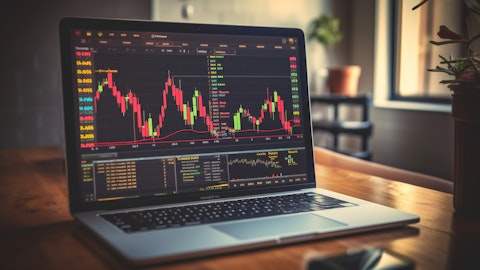Chris Doyle: Yes, we’re there. We had TSAs for the – covered all three of the transactions. We exited the TSA with Vencer late last month. And so this is real-time news, but these assets are all in our hands. I think to your point, we saw some real encouraging results towards the end of the year as we’re pulling our budget together. We rolled in some of those efficiency gains into the 2024 plan. But to your point, we did not anticipate nor did we assume that this team would hit the ground running. And again, I want to reiterate, this is only one quarter in, but the DNA of this team that we pulled together in the Permian is so much like the team that we have in the DJ, super hyper competitive. We want to lead industry in both basins that we’re operating in.
And I’m just so proud to be a part of the team that has been able to knock down those results as quickly as they have. I think as we go forward, and into the next quarter or a couple of quarters as we continue to gain confidence in our ability to extend laterals and drive cycle times down. If the first quarter is any representation of what we’re going to see in the next three quarters, we’re going to have some decisions to make on do we want to redeploy some capital to the drill bit and potentially increase going into 2025, we want to extend the inventory through our ground game or do we want to get that cash back to shareholders. I think it’s going to be a fun discussion to have because any of those three options is a win for our shareholders.
And we’re just super excited to see what this team continues to deliver.
Oliver Huang: Awesome. That’s helpful. And maybe a follow-up. Just on the asset sales, good to see the completion of that midyear target on divestiture front. Are you all pretty much done on this front for the time being? Or are there other assets that kind of remain within the portfolio, which you might have looked to kind of prune to bring some more value forward?
Chris Doyle: Yes. I think with this executive team and the broader team, I don’t know that I’d say wherever truly done. I think when – we are always looking for ways to optimize shareholder volume, value and how to optimize our portfolio. And sometimes that we mean assets are more valuable in other hands. It was important for us when we announced the first two transactions to say, look, we’re essentially about to double the size of the portfolio, let’s make a commitment to ourselves and to our shareholders that we’re going to take a hard look at what is core and what is non-core and commit to hitting $300 million by midyear. To be able to do that ahead of schedule and honestly, at the value for non-core assets that I would have taken the under on a year ago is, again, a testament of a very capable, very strong team.
So I’d say we will continue and always look at ways to optimize our overall portfolio. And – but I will say that we’re happy with what we’ve achieved and excited to get this behind us.
Marianella Foschi: Oliver, I’ll also add that for us, like Chris said, our focus is to create shareholder value, there’s an opportunity to do that. I mean a lot of the non-core just further back in the schedule of strained acreage, we could use that to sell it, right, like we did. We can also use it to trade it, right? And Chris alluded to the ground game. I mean I will say that is an incredibly huge opportunity for us to create value and I’ll give you an example. I mean some of the traits we recently did in the Permian specifically, we traded into net – more acres that allowed us to extend laterals. And you saw about a 10 gross load decline in account for this year, but that was for extending lateral lens from 2 miles to 2.2. That trade, just to put it in perspective, that was 4 million BOEs of proved reserves that we got for zero cost.
And so if we can do that for no cash, I mean imagine what we could do with some cash, which – this is all within part of our budget. But just wanted to underpin that because it’s something that we don’t spend a lot of time necessarily talking about, but it’s creating a lot of value just behind the scenes, if you will.
Oliver Huang: Makes sense. That’s great to hear. Thanks for the time guys.
Operator: Our next question comes from Steven MacCurdy from Pickering Energy Partners. Your line is now open.
Kevin MacCurdy: Yes. Hi. It’s actually Kevin MacCurdy. Yes, I would agree you got a pretty healthy price on those asset sales. In fact, it looks like you sold those assets at a higher valuation than where your stock is currently trading. My question is on efficiencies. You brought online more wells than we anticipated, specifically in the DJ Basin. You talked about balancing growth and free cash flow. But I guess, at what point does it make more operational sense to keep activity steady which could be an acceleration of your capital plan? And is that a decision that’s driven by cost or commodity price?
Chris Doyle: Yes. Thanks, Kevin, for the question. I think you’re hitting on a key part of how you ultimately drive capital efficiency. And if you’re yo-yoing activity, sometimes that can be difficult. We did accelerate activity in both basins actually because it was a more efficient use of capital. And so it created a little bit of lumpiness and pulled some capital into the first quarter. In many respects, the level set activity across both basins will lead to the most efficiency gains. I think in the Permian, the issue that we have right now is you have a team that is rapidly changing the equation by peeling out days on the drilling side and completion side. All good things, but it is leading to a little bit of lumpiness. I would say that we look at this on a continual basis and whether that is – we’re going to level load and keep things flat and just see if we can run harder that way or if we can – or if we add in a little bit of lumpiness, whatever is the best, most efficient way to generate cash flow and get that back to shareholders what we’re going to do.
Kevin MacCurdy: Great. That’s the only question for me. Thank you.
Chris Doyle: Thanks, Kevin
Operator: Question Comes from Leo Mariani from ROTH MKM. Your line is now open.



